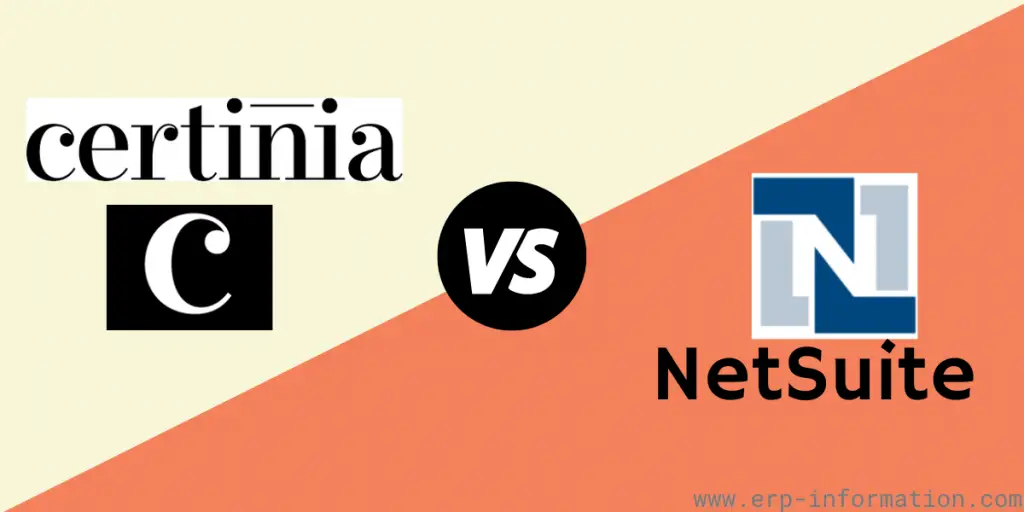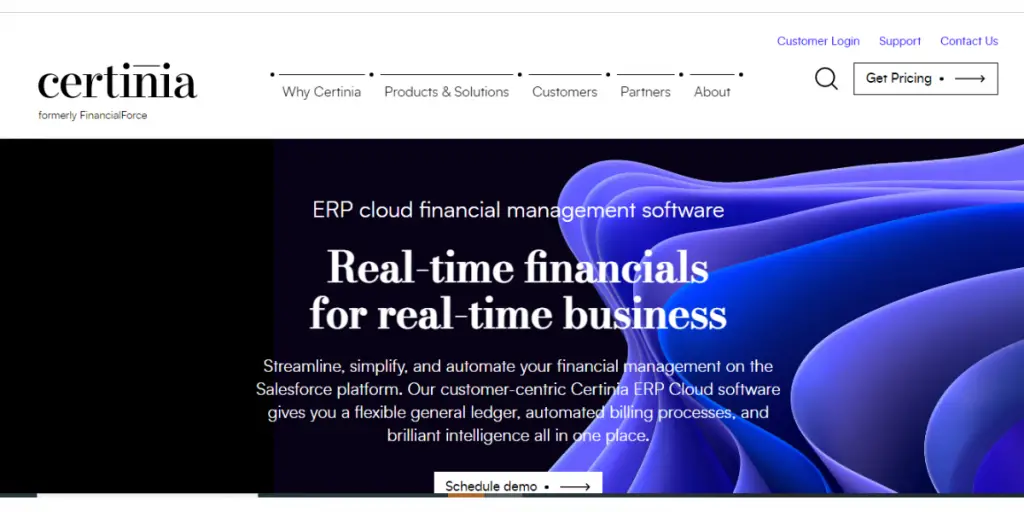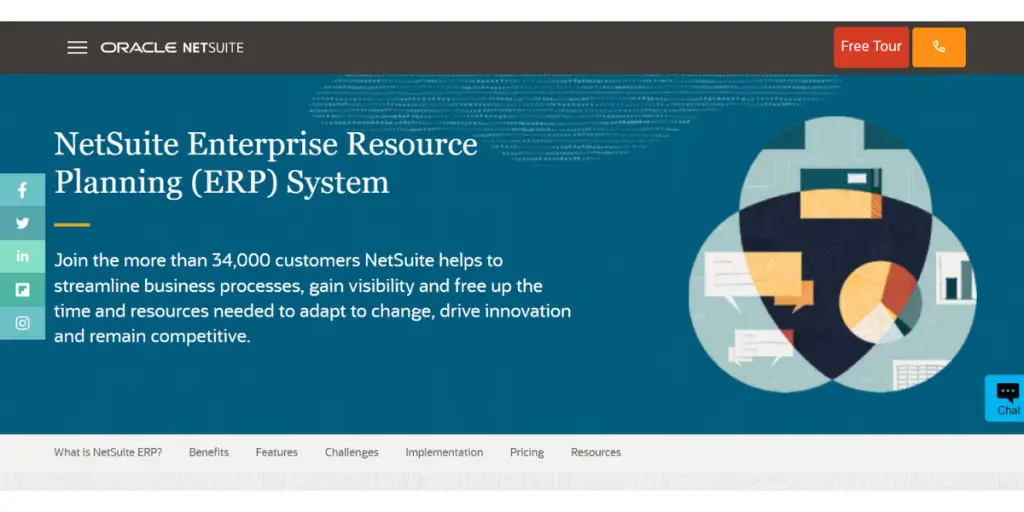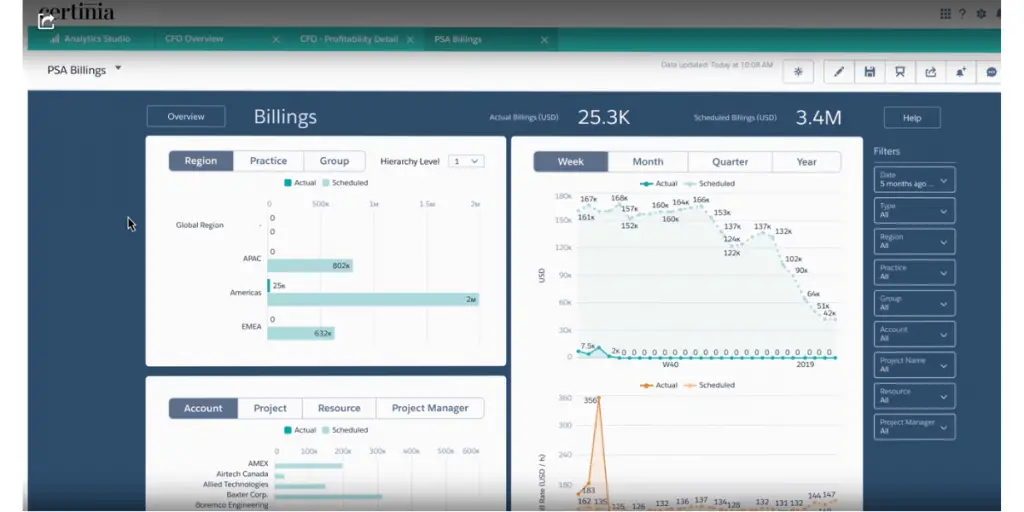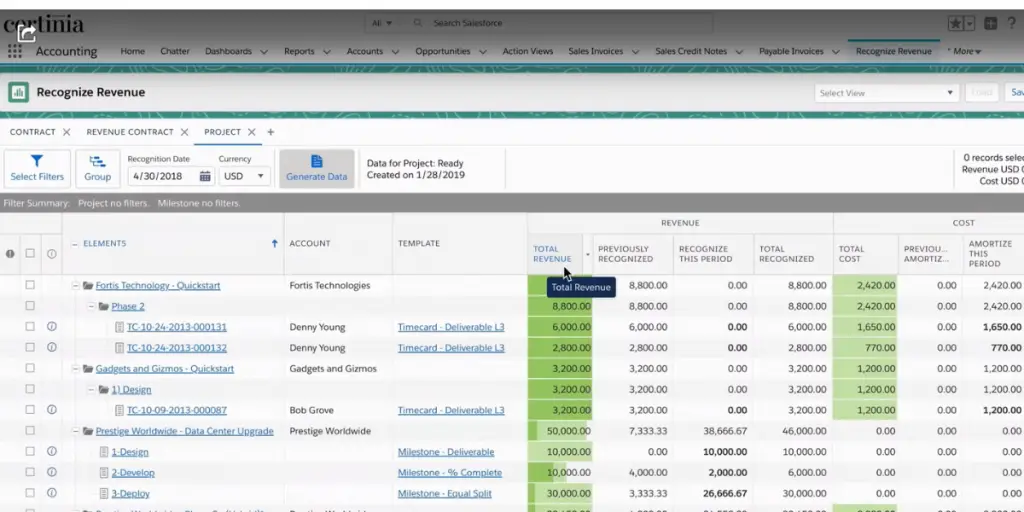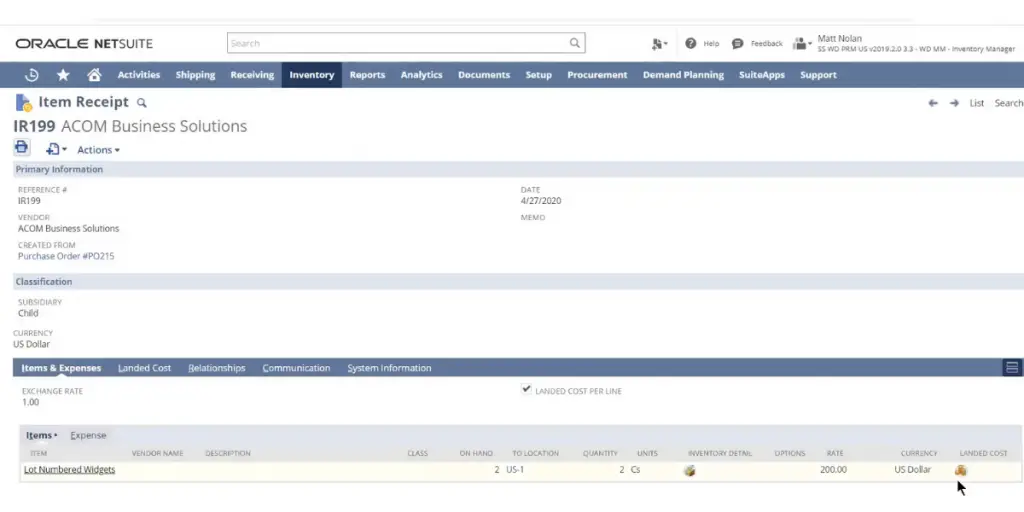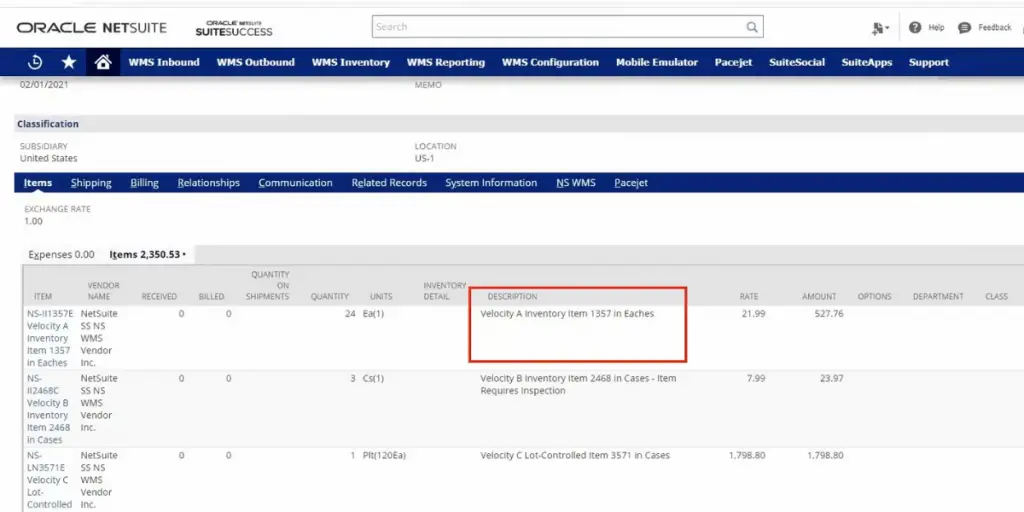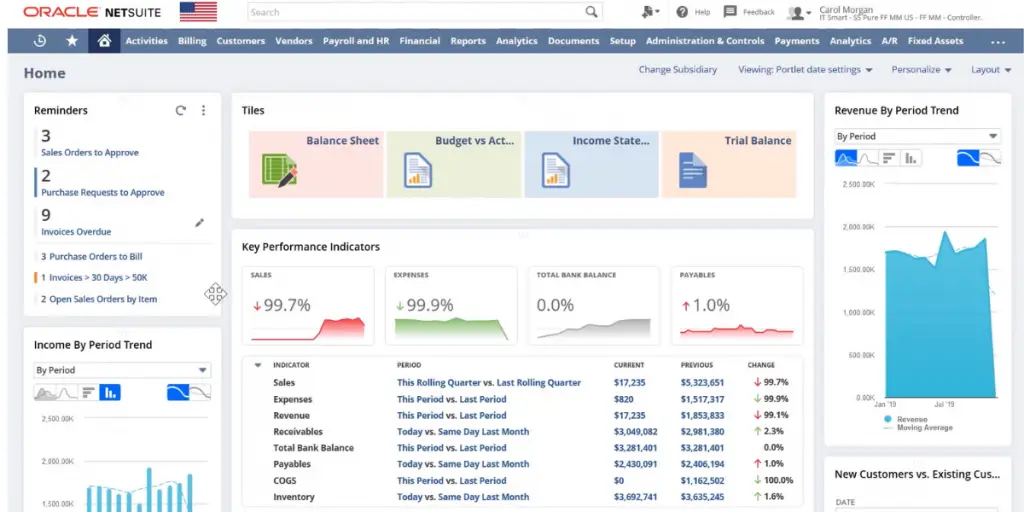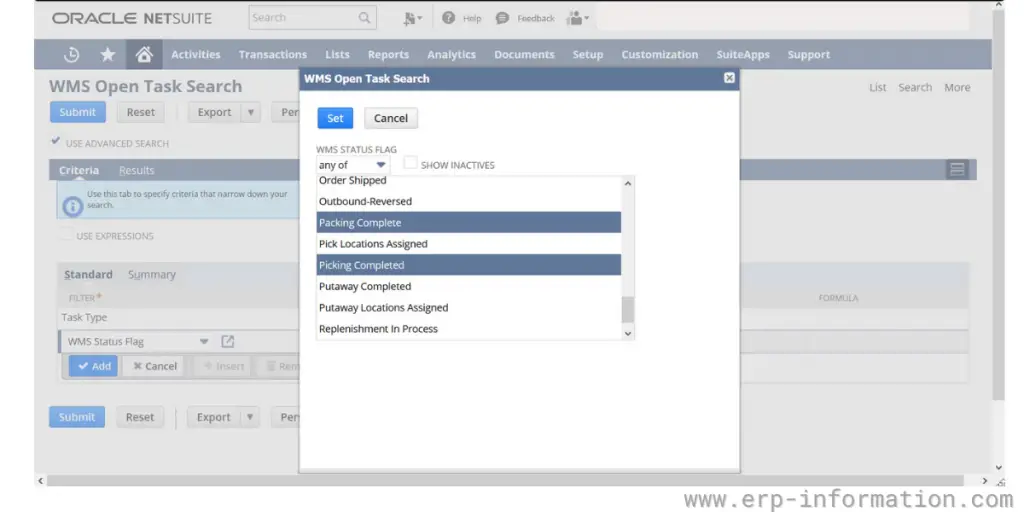Companies constantly seek efficient and effective solutions to manage their operations in today’s competitive business landscape. As a result, Enterprise Resource Planning (ERP) software has become increasingly popular to streamline processes and integrate various aspects of a business.
The post will compare two leading ERP solutions: Certinia vs NetSuite. Both offer comprehensive features designed to help businesses optimize their operations, from financial management and inventory control to customer relationship management and e-commerce. We will dive into the key differences, strengths, and weaknesses of Certinia and NetSuite to help you decide which software best suits your organization’s needs.
Let us start comparing certinia and NetSuite ERP solutions.
What is Certinia?
Certinia is a Services-as-a-Business model that delivers a comprehensive solution suite that brings certainty to your operations.
In May 2023, FinancialForce underwent a rebranding, now known as Certinia. Formerly a Software as a Service (SaaS) business application based on the Salesforce platform, Certinia has expanded its offerings to include Cloud ERP solutions and professional services automation through its Services as a Business (SaaB) Platform.
It offers Professional Services Automation, Customer Success, Services CPQ, and ERP cloud in one place.
Its ERP cloud financial management software automates, simplifies, and streamlines financial management on the salesforce platform with various features, including billing process automation, general ledger, and brilliant intelligence.
What is NetSuite?
NetSuite is a cloud-based ERP solution that offers a complete suite of financial, customer relationship, and inventory management applications. It provides users with real-time visibility into all aspects. However, NetSuite is not built on the Salesforce Platform and does not integrate with Salesforce CRM.
Certinia vs NetSuite
| Certinia | NetSuite ERP | |
| Customization | Customization in Certinia is more complex as it is built using the Apex programming language. This requires specialized knowledge and expertise in Apex, making customization more challenging and time-consuming compared to NetSuite. | Customization in NetSuite is straightforward, thanks to its pre-built industry-specific modules. These modules allow businesses to tailor the software to their specific needs without extensive development work, making the process efficient and user-friendly. |
| Reporting | For robust reporting in Certinia, users need to purchase additional reporting applications. The base platform does not offer as extensive a range of reporting tools as NetSuite, necessitating extra investment for full reporting functionality. | NetSuite offers a comprehensive suite of reporting and analytical tools. Users can create real-time reports, leveraging built-in capabilities to gain insights and make data-driven decisions promptly. |
| Integrations | Integration with applications outside of SalesForce requires the use of additional integration tools. Unlike NetSuite, Certinia does not come with many pre-built standard integrations, which can complicate the integration process and require further resources. It integrates with software like AccessPay, ADP, Avalara, Sap Concur, Jeera, Avidxchange, and B2B Gateway. | NetSuite excels in integration capabilities, providing numerous in-built standard integrations with a variety of business applications. This ease of integration allows for seamless connectivity with other systems, enhancing overall business efficiency. It integrates with other solutions, including customer relationship management (CRM) software, e-commerce platforms, and social media networks. |
| Pricing | Certinia offers simplified, scalable pricing. It offers pricing per-user basis via priced bundles or a la carte licenses. | It offers subscriptions like an annual license fee. The license will include core platforms, optional modules, and a number of users. You need to pay a one-time implementation fee for the initial setup. Then, as your business extends, you can add new users and modules. |
| Implementation | It provides product specialists and well-experienced managers to help users in the implementation process. It also offers authorized service providers to implement apps. | It offers a smart, step-by-step implementation process in a predictable time frame to go live. |
| Language support | Danish, German, English, French, Hebrew, Italian, Japanese, Korean, Dutch, Norwegian, Portuguese, Russian, Spanish, Swedish, Turkish, Chinese (Simplified) | Czech, Danish, German, English, Finnish, French, Indonesian, Italian, Japanese, Korean, Dutch, Norwegian, Portuguese, Russian, Spanish, Swedish, Thai, Turkish, Vietnamese, Chinese (Simplified), Chinese (Traditional) |
| Customers | Elastic, MDA, Splunk, HP, Red Hat, Design | Xerox Siemens, Cisco |
| Device support | Windows, Mac, Web-based, iPhone, Android | Windows, Mac, Web-based, iPhone, Android |
| Free trial | Not available | Free trial |
| Company size | Small to Large enterprises | Small to Large enterprises |
| Customer support | Email/Help Desk, FAQs/Forum Knowledge Base, Phone Support, 24/7 (Live Rep), Chat | Email, phone, training, tickets, video tutorials |
| Number of users | 1400 | 34000 |
| Deployment | Cloud, SaaS, Web-based | Cloud, SaaS, Web-based |
| Competitors | Quickbooks, Acumatica Cloud ERP, Oracle NetSuite, Multiwave CPQ | Bright pearl, Sage, Acumatica, Salesforce CPQ |
Certinia features
- Accounting and Finance – It simplifies your financial operations by automating routine tasks and generating real-time financial analysis, modeling, and compliance reports in English (US).
- Billing management – Flexible billing management provides different billing options, such as recurring, fixed, and one-off. Billing is based on product, subscription, and usage-based (days, monthly, yearly) for products or services.
- Revenue management – It includes multiple revenue functions, including the past, present, and total revenue information, that helps to simplify complex revenue calculations.
- Financial planning and analysis – It improves your budgeting process by turning it into a forecasting engine. It uses a single platform for core financials and analytics to speed up planning cycles, make quicker decisions, and accelerate business growth.
- Procurement – It simplifies the entire procure-to-pay process, including direct and indirect spending, inventory control, workflow approvals, and supplier agreements.
- Order and inventory management – It makes ordering and delivering goods and services easier. Obtain adaptable pricing models, access to potential additional sales, information about available stock, and profit margin for each item.
- ERP analytics and reporting – By utilizing ERP analytics and reporting powered by CRM analytics, you can generate unique business insights that will enhance your revenue and streamline your operations. You can make data-driven decisions that will expand your business and provide predictability.
Billings page view of Certinia
Recognize the revenue page of Certinia
NetSuite features
- Accounting software – Helps streamline the general ledger and automate the accounting process. In addition, it provides transparent and real-time information about all financial activities.
- Financial management – Allows companies to track and manage financial transactions, investments, taxes, and other issues related to their finances.
- Global business management – It supports a wide range of business units, languages, and currencies that help to expand business worldwide.
- Inventory management – Most of the inventory processes are automated. It includes Inventory tracking, determining to reorder points, replenishment of inventory, ensuring the safety stock level Etc.
- Order management & fulfillment – It streamlines the entire order management process from sales order entry to invoicing. It also includes split shipments and drop ships.
- Warehouse management – It streamlines the entire warehouse management process. It helps to improve labor efficiency, track inventory in real-time, and provide visibility across multiple locations.
- Supply chain management – Automates all aspects of the supply chain, from supplier selection to product delivery. It also helps companies reduce costs by monitoring internal and external resources and evaluating performance over time.
- Procurement: It helps companies manage their procurement process, including budgeting, supplier selection, and cost tracking. Additionally, it enables effective inventory management by keeping track of stock levels and ordering new supplies when needed.
Item receipt inventory of NetSuite
Items warehouse management of NetSuite
Global business management of NetSuite
WMS open task page of NetSuite
Both Certinia and NetSuite offer similar features and benefits. But, there exist a few key differences between the two solutions. Here’s a closer look:
Pros and Cons of Certinia and NetSuite
Pros
Certinia
- The software is hosted on the Salesforce platform and is more flexible.
- It provides global-level real-time reporting
- It provides a good audit trail
- It provides a modern and user-friendly interface
- Provides a single source of truth by centralizing customer data in one place.
- Approval automation makes clear guidelines and helps to stay in compliance.
NetSuite
- Cloud-based software with more flexibility and customization
- Easy to add new script via SuiteScript
- You can add functionalities to NetSuite or integrate it with other solutions without additional cost.
- It has an intuitive, interactive user interface.
- With NetSuite, data and transactions can be saved quickly and easily. It also has high scalability to meet customer needs.
- Features are highly customizable and do not need developer support.
Cons
Certinia
- Unavailability of basic functionalities such as banking feeds and BAS reports
- Sometimes, the user interface will be clumsy and confusing
- It does not allow you to discard not yet posted journal entries in bulk.
- Reports are not user-friendly.
- It will be difficult to handle for new users. Users must have good knowledge of SaaS and accounting to handle it.
- The steep learning curve for users with less accounting knowledge
- It offers integration with other business applications but requires extra configuration work.
- The implementation process is quite long and requires many tests according to the number of customization you need, so it is time consuming and needs developer support.
- System slowdowns occur after a while.
NetSuite
- It offers discount pricing while subscribing to the software. Then it will take off the discount, and you must pay the full subscription price.
- Steep learning curve
- Lack of good training before going live
- Unclear permissions
- Search queries take more time to execute compared to competitors.
- Demand planning does not consider inventory expiration dates.
- With SuiteCommerce, you can use only sales units. It does not allow you to use different units.
- Generating reports will be cumbersome because of filters and criteria.
- Learning some features will be difficult due to poor training and guidance.
- It isn’t easy to learn for new users.
- You may need a customization package to fulfill your business needs.
- Fewer online self-learning materials
- The implementation and customization are costly.
- Customer support is only reachable some of the time.
Conclusion
Certinia is a good choice for an all-in-one solution that integrates with Salesforce. However, NetSuite may be a better option if you want a more customizable solution.
When considering an ERP system for your business, it is crucial to research and compare various options available to find the one that best suits your needs and requirements.
Here we provided the necessary information on Certinia ERPcloud and NetSuite ERP. By considering the pros and cons of both ERP solutions, you can decide which one suits you best.
By doing so, you can ensure that the selected solution will provide the necessary tools and functionalities to help your business grow and thrive in today’s competitive landscape.
